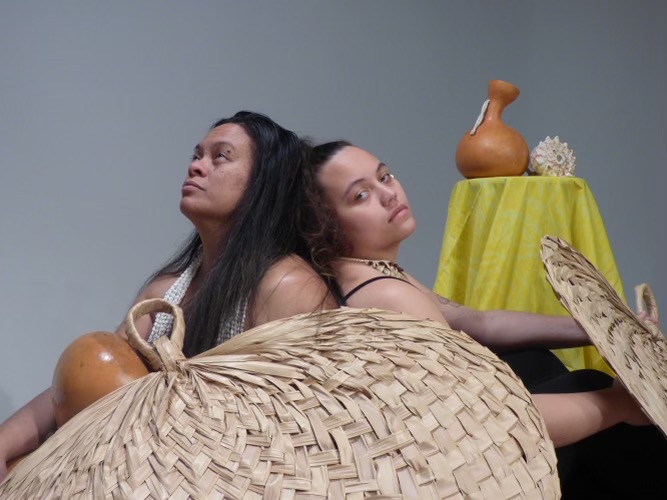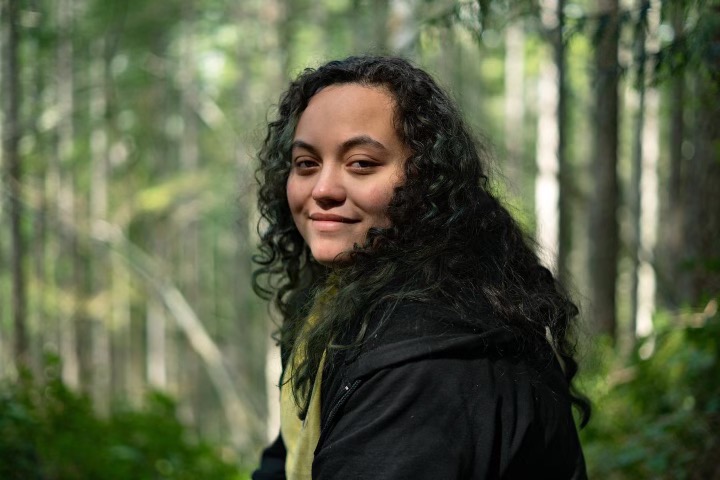By Kai Curry
Northwest Asian Weekly

Ha’aheo Auwae-Dekker (right) and her mother, Henrylyn Kau’i Auwae (Courtesy: Ha’aheo Auwae-Dekker)
“My name is Ha’aheo Auwae-Dekker. I’m going to be graduating from Seattle University in a month…I’m a 22-year-old film-maker. I’m the middle child of five kids to my wonderful mother. I’m originally from Moku O Keawe, the Big Island of Hawai’i.”
This newly fledged and about-to-be-released into the world film-maker speaks with confidence. Ha’aheo (they/them) did not plan to go into film and considers Hollywood and the film industry to be wasteful representations of capitalism. In high school, they found the idea of taking film classes at The Center School to be pretentious and preferred drawing and painting. Then, at 17, Ha’aheo participated in the apprenticeship program for Real Girls, a now-defunct Seattle organization “mostly dedicated to getting marginalized voices into filmmaking in an industry that’s so dominated by white men. I did it, and I absolutely fell in love with it, and I just kept doing it.”
As a film major, Ha’aheo has created a documentary which is the first they have shown outside of class or family. Now traveling the festival circuit, the short film, called “Malihini” (which means tourist in Hawai’ian), was a centerpiece documentary at the Seattle Asian American Film Festival in March 2022 and recently screened at NFFTY, the National Film Festival for Talented Youth. Ha’aheo made the film in Social Justice Cinema class where the professor encouraged the film to be shared: “You’d be doing the world a disservice by not showing your work.”
In the film, Ha’aheo interviews their mother, Henrylyn Kau’i Auwae (she/her), while the viewer watches several scenes layer together: driving in the car; at home, in the yard; and inside the house, where Henrylyn performs a hula, the dance once forbade by white missionaries.

Ha’aheo Auwae-Dekker (Photo from Ha’aheo Auwae-Dekker)
The setup of the film is deceptively simple – something any of us might have done for a school project — yet, it’s not simple at all. The questions asked are of the soul, and the scenes, though seemingly casual, are stitched together purposefully to create a mood and message. Ha’aheo and Henrylyn drive through the city at night. There is that peculiar ambience of empty streets and colored lights, when you are close in your car, talking of important things. The city is blurry, and we understand that the city is not home. At one point, the camera lands on a sign – “Asian Plaza” – just as Ha’aheo is asking Henrylyn, “Do you feel like you’re an American?”
Henrylyn’s answer: no. “I live on this continent. And yes, I was born in the United States, but I was born as a native of the Kingdom of Hawai’i.” She adds, “I still respect the land. I still respect the people, the keepers of this land.” Ha’aheo, when posed the question by the Weekly, answered: “I don’t consider myself American. Hawai’i was illegally occupied and overthrown by the United States [in 1893]. Before then, Hawai’i was an independent nation. I’m a child of that independent nation.” Ha’aheo sees being a kanaka maoli (native Hawai’an) as inherently political and balks at “aligning with a corrupt system.” “Because I’m Hawaiian, I have to live my life as a political person because my existence is always made political.”
Ha’aheo’s activism is well defined. When they hear a question like, “What’s a good way to ethically travel to Hawai’i?” their voice quickens with passion. “You cannot ethically be a tourist in Hawai’i…tourism is inherently a pillar of capitalism. There’s no way to be a sustainable tourist because tourism relies on resorts, it relies on waste, it relies on taking native land.”
Ha’aheo reminds non-Hawai’ians to respect boundaries, especially in a time when visitors only exacerbate the pandemic; and when, in Ha’aheo’s view, platforms like TikTok give people the “insidious” notion that they have a right to information. “Don’t expect native Hawai’ian people to answer you…So often, non-indigenous people come into spaces with this non-reciprocal energy to them…They’re ready to receive in a way that makes them feel good about themselves…but they’re not ready to give back…If you can provide that reciprocation that we provide every single day of our lives, then we can get somewhere.”
Ha’aheo wasn’t always as certain about identity as now. Growing up on “the Mainland” (continental US), Ha’aheo struggled with not feeling “Hawai’ian enough.” Half-white, they felt “caught between two worlds,” and not “enough” of either. For Hawai’ians, connection to the ʻāina (land, family, home) is paramount. “When you’re Hawai’ian, you get asked three questions,” they explained. “One, what island are you from? Two, who’s your family? Three, what high school did you go to? I could never answer all three.”
In the film, Henrylyn talks about the hard decision to leave Hawai’i, which she regrets, even though it brought opportunities to her children. It didn’t help that, when the family relocated to Seattle in 2012, they encountered the “Seattle Freeze” – and a Hawai’ian community more spread out than they had encountered in other states. “All my aunties and uncles in California were either Hawai’ian, Tongan, or Samoan.” Ha’aheo recalled. Here, “the closest Pacific Island community is Tacoma,” with “little pockets” elsewhere. The family does it’s best to stay connected. While she, too, humbly insists it’s not enough, Henrylyn endeavors to transmit Hawai’ian culture. She has taught Hawai’ian language and is currently the owner of Ola Mai I Loko Mai on Airport Way, where she and her son, Elijah, specialize in Hawai’ian-style massage, or lomilomi. As mentioned in the film, she is a knowledge keeper. “If I don’t teach, who will?”
When the family arrived in Seattle, Henrylyn taught hula at what was then Nikkei Horizons. “Hula is an extraordinary way to stay connected,” Henrylyn shared. “It’s a way to keep us grounded in who we are as a people.” She elaborated that, in the film, “That’s part of what Ha’aheo highlights…that feeling of disconnection [from] your grandparents’, culture and who you are, genetically.” In “Malihini,” Henrylyn’s hula flows like water. She smiles as if full of the knowledge of the heritage of what she’s doing and the joy of sharing that with her family.
I miss my ʻāina every moment and every second of every day,” Henrylyn says, in the most moving part of the film. “If I could, I would pack up and move today.”
The Hawai’ian way of life is endangered. More and more, Hawai’ians are becoming like malihini, forced to leave the islands due to the high price of living. “My mom says in the film, ‘I feel like a foreigner in a foreign country, on a foreign continent’” When Ha’aheo realized the extent of the problem, the film’s name was born. “I thought of that…to describe a very Hawai’ian experience that’s particular to today.”
To support Ha’aheo’s newest project go to www.indiegogo.com/projects/baby-teeth-a-short-film.
Kai can be reached at info@nwasianweekly.com.



